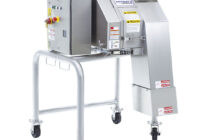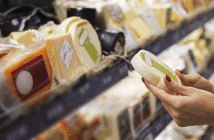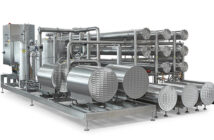
Product contamination – no-one is immune, so are you prepared?
Last year’s food safety scare in the New Zealand dairy industry illustrated how one single product contamination threat could spiral into a serious international event with the potential to destabilise an industry, its trading partners, the export markets and even the country as a whole. The impact of a product recall incident can create long lasting damage to brands, business reputations and it may even lead to a lack of public confidence that could tarnish a whole industry sector.
By Ron Curin & Suzanne Brown, AIG
Today, growing public awareness and changes to food safety regulations – including a review of the Food Act 1981 in New Zealand and the tightening of the Australia New Zealand Food Standards Code – has resulted in more intense scrutiny of food safety and how businesses operating in the food and beverage industry manage their risk. Moreover, the ability of a company to respond quickly to prevent harm to their customers in the case of a contamination event can mean the difference between success and survival.
Regardless of size, industry, location or reputation, a company can be left in ruins if a recall event is not managed properly. It’s important that a business acts to prevent a recall event turning into a full blown crisis. Every month, there is an average of five product recalls across Australasia, two in New Zealand alone and it’s likely that many companies will face a recall event at some point in time. It’s important that companies understand the risks they face and take steps that can reduce or even eliminate them. By taking a proactive risk assessment approach to identify areas of threat, a business can be better positioned in future to manage an event and thereby protect their brand, reputation and balance sheet. In fact, where a business can be seen to have skilfully handled a recall event, they may not only minimise the potential harm to the public, but also demonstrate care, reliability and professionalism to their valued wholesale and retail partners and customers.
There are several key steps that a company can take to protect their financial and reputational exposure:
1. Work out where the risk is and the potential costs of a loss
By identifying the source of a risk and estimating the magnitude of a potential incident this can help to mitigate or even eliminate some areas of risk. Knowing what a “worst case scenario” could look like if an incident occurred will help focus the development of safety programmes and procedures and provide comfort that the company’s insurance cover is appropriate.
AIG has developed NOVI that can help a business with this process, enabling companies to better understand their potential risks and exposures to a recall event. NOVI is a product recall cost estimator that can calculate a company’s probable maximum loss for a recall event. More information can be found at www.aig.co.nz/NOVI
2. Develop a “Risk Management” Plan
It’s really important to have stringent product safety programmes and solid recall procedures. In our experience we’ve found it best to think of a company’s plan not as a formal “recall plan” but as a step by step “risk management programme” that blends recall with business continuity and crisis management planning.
There is a major divide between companies that have a formulated and robust plan and those that tend to be more reactive to an event without a well thought through plan. Without a plan and a framework companies can see a situation slip away from them and quickly escalate into a crisis. By adopting a simple four point plan, a business can be better positioned to face an incident. These elements are:
- Fast, accurate investigation
- Robust assessment and decision making
- Well thought out strategy and
- Effective communications.
3. Routinely test, update and validate your recall procedure effectiveness
Regular testing ensures that all employees understand the process, identify any gaps in that process and are conversant with their individual responsibilities are in the event of a recall event. Just like a sport, more practice ensures that the end result is usually better. Mock recall simulations and training are a great way of testing how well a company’s risk management programme shapes up and can improve the outcome as the employees become more familiar with the part they play.
4. Keep up to date with what’s happening in the industry and be aware of emerging trends
The food and beverage industry will continue to and evolve and with this change we will see heightened challenges. Over recent years we’ve seen changes in the use of cheaper and (sometimes) lower quality imported ingredients, more complex supply chains, increasing allergy exposures (or at least public perception of exposures), as well as better and more accessible technology to detect contaminations. Additionally, an increased focus on food safety standards and accompanying legislation will continue to develop and it’s important to stay abreast of these changes…
5. Make sure your suppliers adhere to your high safety and quality standards
The most robust of internal plans can quickly collapse if suppliers do not adhere to the same high standards that you hold your own business to. One area that we have seen companies make a difference with is the adoption of an approved supplier programme. Having a better understanding of a company’s suppliers cannot be underestimated.
6. The right insurance is a critical part of your overall risk management framework
Recall insurance provides cover for recall costs, loss of gross profits and rehabilitation costs following either accidental or malicious contamination. As well as protecting your company’s financial health following a recall incident, it’s critical that an insurer has the resources and expertise to assist with the right advice, support and guidance to identified the risks to a company well before they become a problem.
An insurance policy is more than just protection provided to businesses when things go wrong. Product recall insurance can support customers with additional services to provide a complete crisis management solution. The focus goes beyond financial compensation and rehabilitation following an event, reducing a client’s risk of an event by providing ‘pre-incident’ risk-management consulting prior to an incident, and expert response consultants should a recall event occur.
Through the knowledge gained from helping other businesses through product recall incidents, a good insurer can work with customers to prevent and manage recall incidents, ensuring that they do not escalate into a crisis. For some customers, a full loss prevention service will form part of their Product Recall Insurance program, and the resulting recall program will form a key part of their overall risk management framework, including their vital business continuity plan.
Today, customers and regulators expect both high safety and governance standards, including assurance that a company has the correct procedures in place should they face a product contamination incident. Product recall insurance complements a comprehensive product safety programme, minimising the potential impact of a product recall incident, and ensuring a swift, effective and assured response should one occur.




























































































